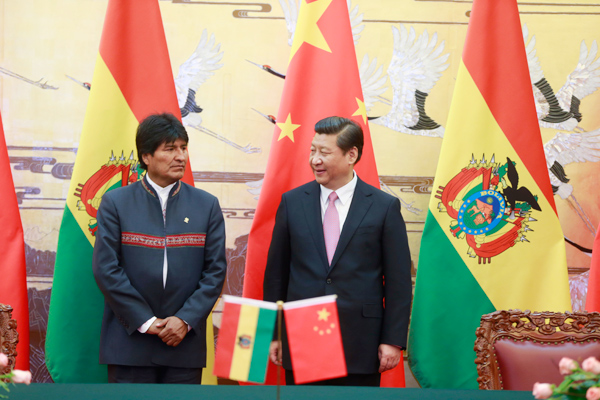Morales in China to meet with leaders, witness satellite launch
 |
|
President Xi Jinping and his Bolivian counterpart Evo Morales attend a signing ceremony in Beijing on Dec 19, 2013. The two countries have also signed economic cooperation agreements in which China will provide financial support to Bolivia. [Photo / China Daily] |
Bolivian President Evo Morales made the remarks during his meeting with Chinese President Xi Jinping in Beijing.
The three-day visit will also see Morales traveling to Southwest China to watch the launch of Bolivia's first communication satellite on Saturday, which China helped build.
During the meeting, the two leaders pledged to "develop well" cooperation projects in the mineral, high-tech and aero sectors, as well as infrastructure buildup, according to a Chinese Foreign Ministry news release.
The two countries have seen joint efforts in Bolivia's satellite and railway industries, which are crucial to improving the landlocked country's telecommunications and infrastructure.
"Your visit will bring new momentum to our nations' ties," Xi told Morales.
The two countries also signed economic cooperation agreements on Thursday in which China will provide financial support to Bolivia, but the specific figure remains unknown.
This is Morales' third visit to China.
He visited China in 2006, shortly after he won the Bolivian presidential election. His visit then was regarded as a sign that the Latin American country was seeking a closer relationship with China, especially in economic cooperation.
Morales, known for his informal style, arrived on Thursday for the meeting in an open jacket and shirt and was welcomed by Xi at a grand ceremony.
Morales said during the meeting that he has learned about China's revolutionary founder, Chairman Mao Zedong, since his childhood and he used to herd sheep with China's national flag in hand as a boy.
On Saturday, Morales will be at the Xichang Satellite Launch Center in Sichuan province for the launch of Bolivia's first communications satellite.
The satellite, to be operational in March, aims to strengthen Bolivia's broadcast communications, distance education and telemedicine.
Bolivian media reported that the satellite will help the nation reduce its $15 million annual bill for renting foreign satellites' time and services.
Allowing complete national coverage in the country, the satellite will also allow Bolivia to rent out services to South American countries such as Colombia, Ecuador, Paraguay, Peru and Uruguay, said Ivan Zambrana, director of the Bolivian Space Agency.
The program involved an investment of $300 million, including construction, launch and orbit placement, setting up ground stations in La Paz and Santa Cruz, and training, according to China Great Wall Industry Corp. Much of that investment was loaned by China Development Bank.
Xie Wenze, an economist at the Latin America Institute of the Chinese Academy of Social Sciences, said the satellite is the highlight of China and Bolivia's high-tech cooperation and can greatly improve Bolivia's socioeconomic development.
Such cooperation also benefits China in high-tech exports, especially in gaining a bigger share in the world's satellite industry, he added.
China and Bolivia's economic cooperation is growing.
Bilateral trade volume reached $516 million in the first eight months of 2013, an increase of 18 percent compared with the same period last year, according to Chinese customs data.
"Bolivia is rich in natural resources, such as natural gas and iron. There is a lot of potential in China-Bolivia trade," Xie said. However, economic development is limited by Bolivia's underdeveloped infrastructure, especially the transportation system.
"Bolivia is a landlocked country with poorly developed railways. Even though it has the second-largest natural gas reserve in Latin America and huge amounts of iron mines, it is difficult for it to reach the international market," Xie said.
To solve the problem, Bolivia is trying to build more railways.
According to the Bolivian government, China Railway Group and China CAMC Engineering Corp just won a bid on a $250 million railway construction project.
"The project is to complete Bolivia's railway network, which can improve its domestic transportation as well as its connection with the world. It will also help create a stable social environment for Bolivia's economy," Xie said.
Contact the writers at wujiao@chinadaily.com.cn and zhangfan1@chinadaily.com.cn
|
|
|
|
|
|
|
|
